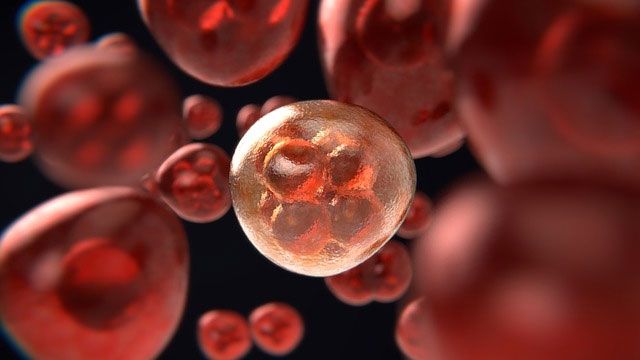A slight, persistent inflammation in the tissue is considered one of the biological hallmarks of the aging process in humans – and is also a risk factor for diseases such as Alzheimer’s or cancer. Professor Francesco Neri and Dr. Mahdi Rasa from the Leibniz Institute for Research on Aging – Fritz Lipmann Institute (FLI) in Jena has for the first time succeeded in describing the regulatory network that drives the general, multiorganic inflammatory response at the molecular level. They were also able to show that a dietary restriction can influence this feedback loop and thus reduce inflammation.
Inflammation is an inherently beneficial immune response in the body: our immune system uses it to fight pathogens or to remove damaged cells from tissues. Once the immune cells have done their job, the inflammation subsides: the infection is over and the wound has healed. In contrast to such acute inflammation, age-related chronic inflammation is not local. The innate immune system increases its activity overall, resulting in low-level chronic inflammation. This age-related inflammation is also known as inflammation.
Inflammation affects health
This underlying inflammation has health consequences: “If you have constant activation of immune cells, it can lead to their depletion, which in turn leads to problems when you have an infection. Immune cells may no longer respond properly. Inflammation is also related to the development of cancer – because we see increased cell proliferation in inflamed tissue,” explains Prof. Francesco Neri, who heads the “Epigenetics of Aging” research group at the Leibniz Institute for Research on Aging – Fritz Lipmann Institute (FLI) in Jena until the end of 2021. The biologist now teaches and researches at the University of Turin, Italy.
How do aging, inflammation and nutrition interact?
together with dr Mahdi Rasa and other colleagues at the FLI, Prof. Neri conducted a study in mice to investigate how the chronic inflammation associated with aging is regulated and maintained by genes – and whether dietary restriction affects this regulatory network and inhibits inflammation can. In fact, studies over the past two decades have shown that various animals — from flies to worms and rodents to monkeys — live longer when fed a diet that reduces calorie intake. For example, when mice ate 30 percent less food, they were fitter, more active, and lived three to four months longer—equivalent to a 10 to 15 percent increase in lifespan. Improved health has also been observed in humans on reduced calorie diets. It is also known that inflammatory reactions can be reduced by this dietary approach. However, how inflammation, aging and food restriction are regulated in detail at the molecular level and how they are related is not yet understood.
Inflammation feedback loop
For her current study, which was recently published in the journal cell reportsthe FLI researchers first compared four-month-old mice with older mice (22 months). In contrast to previous studies, the activity of the genes was not only measured in one organ, but in several tissues in parallel: blood, brain, heart, kidneys, liver, lungs, muscles and skin. “The focus was on examining the affected pathways in all tissues in order to understand inflammation at a systemic level,” explains Neri. “We found that the inflammatory state in older mice was characterized by the upregulation of a specific set of genes encoding innate immune system receptors. This upregulation leads to the activation of a number of interferon-regulating genes. And those genes then turn on other genes that produce inflammatory cytokines, as well as Stat1, a major transcription factor for regulating genes related to inflammation. This entire process is like a positive feedback loop that keeps the inflammatory state going.” With this, the Jena researchers are describing the cross-organ and thus systemic regulatory network for the first time (see image below). But can this cycle be broken by reducing calorie intake?
Long- and short-term dietary restriction shows positive effects
To answer this question, Neri and Rasa looked at gene activity in the organs of two other groups of rodents: mice that were fed 30 percent less food for most of their lives (4 to 22 months), and mice that were housed under conditions for only two months at the end of her life. Regardless of whether the calorie restrictions were short- or long-term, the overall diet had a positive effect on all organs studied except the heart.
Systemic regulatory network is the starting point for interventions
With their work, the two researchers also provide starting points for future drug therapies for age-related chronic inflammation. “Within this regulatory network that we describe, a well-studied and important component is, for example, TLR4, a gene that encodes an innate immune system receptor,” explains Dr. Rasa, who carried out the genetic analyzes as part of his doctorate thesis. “The receptor acts like an SOS signal that we don’t need if there are no pathogens to fight. If we could downregulate TLR4, we could reduce the chronic inflammatory response in old age.”
Another much-discussed possibility of intervention is the administration of dietary supplements such as vitamins or probiotics with the aim of influencing the composition of the microorganisms in the digestive tract. “Dietary restriction appears to alter the microbiome, leading to a reduction in inflammation. If it is possible to change the intestinal flora of the microbiome through dietary supplements, the same positive effects could also be achieved without a restricted diet.” Prof. Neri admits that this is still speculation. “We first need a better understanding of the processes involved.”
Relation: Rasa SMM, Annunziata F, Krepelova A, et al. Inflammation is driven by upregulation of innate immune receptors and systemic interferon signaling and is alleviated by dietary restrictions. cell rep. 2022;39(13). doi: 10.1016/j.celrep.2022.111017
This article was republished from the following materials. Note: The material may have been edited for length and content. For more information, please refer to the given source.
#Regulatory #network #revealed #multiorgan #inflammatory #response


Leave a Comment